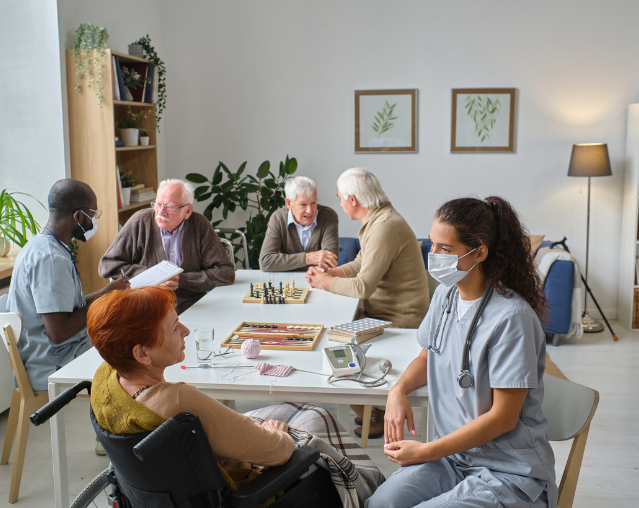What is Rehab?
Rehab—short for rehabilitation—is defined by the World Health Organization (WHO) as “a set of interventions designed to optimize functioning and reduce disability in individuals with health conditions, in interaction with their environment.”1
Rehab refers to different levels of treatment for substance use disorders, including drug and alcohol addiction. Some programs require individuals to stay at the facility, while others offer outpatient care, where patients visit for a few hours each week. In some cases, treatment can also be provided remotely through telehealth services.
The National Institute on Drug Abuse (NIDA) reports that there are more than 14,500 specialized drug rehab centers in the United States.3
Treatment in a rehab program aims to help someone quit using substances and remain in long-term recovery. Common treatment methods in rehab include behavioral therapy, medications for substance use disorder, peer support, and more.2

How Long Do Rehab Programs Last?
Rehab refers to different levels of treatment for substance use disorders, including drug and alcohol addiction. Some programs require individuals to stay at the facility, while others offer outpatient care, where patients visit for a few hours each week. In some cases, treatment can also be provided remotely through telehealth services.
- 30 Day Programs
- 60 Day Programs
- 90 Day Programs

How to Find a Good Rehab Center
Choosing the right treatment facility is crucial, as some offer little beyond basic drug education. A detox-only center, for example, helps manage withdrawal but doesn’t provide the ongoing care needed for lasting recovery. For the best chance at success, look for a rehab that offers comprehensive treatment, including support for co-occurring disorders, ensuring a well-rounded path to healing.
Various rehab facilities across the United States provide comprehensive, evidence-based treatment tailored to individual needs. Dedicated admissions navigators are available to answer your questions and help you or your loved one begin the journey to recovery today.

Why Do People Go to Rehab?
People seek rehab for various reasons, including the need to regain control of their lives, improve their health, rebuild relationships, or break free from the cycle of addiction. Each journey to recovery is personal, but the goal remains the same—lasting healing and a better future.
- They’ve hit a breaking point and are ready for a fresh start.
- Their relationships with loved ones have suffered due to addiction.
- A friend, family member, or professional has pointed out their struggle.
- They’ve tried to quit on their own but haven’t been successful.
- They’ve relapsed and need support to get back on track.

A Day in Residential Rehab
Patients in residential rehab benefit from a structured routine filled with therapeutic sessions and activities. While there is some personal time available between meals, activities, and therapy sessions, much of the day is planned out for patients.
Below is a sample of what one may expect during a day in one of our residential treatment centers:
- 7:00 a.m. Breakfast
- 7:45 a.m. Meditation
- 8:30 a.m. Physical Wellness Training
- 10:00 a.m. Behavioral Health Group
- 11:00 a.m. Relapse Prevention Group
- 12:00 p.m. Lunch and Reflection Time
- 1:00 p.m. Nutrition and Wellness Group
- 2:00 p.m. One-on-One Therapy
- 3:00 p.m. Expressive Therapies in Recovery
- 4:00 p.m. Therapeutic Community Group
- 5:00 p.m. Dinner
- 6:30 p.m. Recovery Meeting
- 7:30 p.m. Clean & Sober Structured Activities/Recreation
- 10:00 p.m. Lights Out
Most days at rehab will follow a similar schedule; however, different days often incorporate varying focuses in therapy and there may be special activities or events throughout the week that will alter the schedule. For example, special events may be held on family visitation days or a group of more seasoned clients may take an off-site visit for a particular type of therapy or activity.

What Type of Rehab Programs Are There?
Understanding your treatment options and seeking out that perfect treatment provider can be a time-consuming task, but your work is worthwhile. Types of programs may include one or a variety of the following:
- Medical Detox
- Inpatient Rehab
- Partial Hospitalization Program (PHP)
- Intensive Outpatient Program (IOP)
- Outpatient Care

What is Included in your Treatment Price?
Understanding your treatment options and seeking out that perfect treatment provider can be a time-consuming task, but your work is worthwhile. Types of programs may include one or a variety of the following:
- Medication management
- Group Counseling
- Individual therapy sessions.
- Family therapy.
- Room and board (for inpatient or residential treatment).
- Amenities (e.g., access to fitness centers, pools, recreational activities).
suggests, for example, that a person living at the poverty level could expect to spend up to half of every dollar of income on the addiction. That leaves little funds available for other vital expenses, including food or housing.
